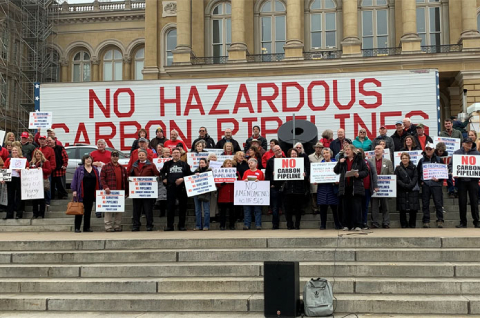By O. Kay Henderson (Radio Iowa)
The Iowa House has overwhelmingly voted to require at least 90% of miles along proposed carbon pipeline routes be voluntarily secured before the government’s eminent domain authority could be used to seize the rest. It also would let farmers seek compensation years from now if crop yields are depressed in the area around a carbon pipeline.
Representative Steven Holt, a Republican from Denison who’s the bill’s lead sponsor, said the pipelines have generated “intense debate” around the state and he called pipeline opponents “freedom fighters.”
“The route of these pipelines in Iowa would impact thousands of fellow citizens, a great deal of farmland and many of our communities,” Holt said.
Some of those who voted for the measure lamented that it did not go far enough in protecting landowners who do not want the pipelines on their property. Republican Representative Bobby Kaufmann of Wilton, a bill backer, blasted pipeline developers and the ethanol industry who’ve been calling for the bill’s defeat.
“When you use government funds to aid your project, when you wish to use the tools of government, such as eminent domain…expect uncertainty,” Kaufmann said. “…The notion that this legislation is going to kill the ethanol industry — there’s a lot of four letter words I could use to describe that and I will not do that — I’ll just simply call it B.S.”
Republican Representative Henry Cisneros of Muscatine has some of the same concerns, but voted against the bill. Cisneros called eminent domain theft. “Your government is in a hurry to facilitate this theft so a single corporation can shovel more of our tax dollars into its bank account,” Cisneros said.
Representative Chuck Isenhart, a Democrat from Dubuque, said if House members believe carbon pipelines have no public benefit, then the bill should have banned construction. “Don’t put the burden of the decision on a small group of landowners to hold out, resulting — no doubt — in a besiegement if the bill becomes law,” Isenhart said.
Representative Zach Dieken, a Republican from Granville, was a reluctant yes. He called the pipelines “a cash cow” for developers and he praised landowners who’ve refused to sign voluntary easements with pipeline developers. “To those actively standing up for yourself and your freedoms, the rest of Iowa and America thanks you,” Dieken said, acknowledging pipeline opponents watching debate in the House balcony. “..I also want to apologize that I couldn’t do more and I’m sorry the government created by God to defend your God given rights was not courageous to do more.”
Summit Carbon Solutions released a statement saying the carbon capture projects will play “a critical role” in ensuring the long term viability of the ethanol industry and the future of Iowa’s ag economy. The Iowa Renewable Fuels Association called the bill “a mistake” that would reduce ethanol production and depress corn prices.
Kim Junker and her husband farm near New Hartford and they do not want the Navigator pipeline to pass through their property. Junker led a rally outside the Capitol late this morning.
“I, like many of you, will do whatever it takes to keep my land and my livelihood out of the hands of money grubbing carbon pipeline corporations,” she said, to cheers.
Junker’s husband drove a semi around the Capitol today with a huge sign saying: “no hazardous carbon pipelines.”
The House passed the bill this afternoon by a 73-20 vote. Two representatives — Megan Jones of Sioux Rapids and Megan Srinivas of Des Moines — announced they abstained from voting before their families could directly benefit financially from the pipelines.
A bill in the Senate that would have set some new regulations for the pipelines died in a subcommittee last month.




